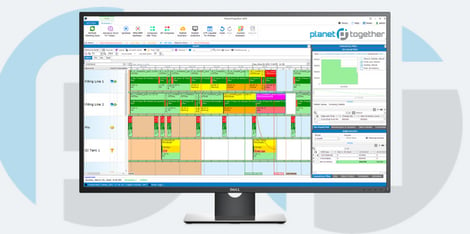
Adaptability and Resilience: The Cornerstones of Effective Production Scheduling in Medical Manufacturing
In medical manufacturing, production schedulers stand at the crossroads of precision, compliance, and efficiency. The pressures to meet stringent regulatory standards while maintaining profitability are further compounded by unpredictable market conditions and supply chain disruptions. To navigate this complexity, adaptability and resilience have emerged as critical capabilities for production schedulers.
Modern tools like PlanetTogether, when integrated with enterprise solutions such as SAP, Oracle, Microsoft Dynamics, Kinaxis, or Aveva, are transforming how production schedules are designed and executed.
This blog looks into how adaptability and resilience can be enhanced through such integrations, ensuring that medical manufacturing facilities stay competitive and responsive in a challenging environment.

The Unique Challenges in Medical Manufacturing Scheduling
Medical manufacturing operates under a unique set of demands:
Regulatory Compliance: Adherence to standards like FDA’s Current Good Manufacturing Practices (cGMP) or ISO 13485 is non-negotiable.
High-Value Products: The stakes are high with products like medical devices, implants, and pharmaceuticals where quality errors can have life-or-death consequences.
Variable Demand: Demand spikes during pandemics or crises necessitate rapid adjustments in production.
Complex Supply Chains: Dependence on global suppliers for specialized raw materials adds layers of uncertainty.
Amid these challenges, production schedulers must ensure precision and agility, making adaptability and resilience indispensable.

Defining Adaptability and Resilience in Production Scheduling
Adaptability is the ability to adjust schedules in response to changes, whether they arise from equipment failure, labor shortages, or shifts in demand. Resilience, on the other hand, is the capacity to recover quickly and sustain operations despite disruptions.
Together, these qualities enable production schedulers to:
Quickly reallocate resources to minimize downtime.
Adjust production priorities based on real-time data.
Build buffer capacities into schedules to absorb shocks.

Leveraging PlanetTogether Integration for Enhanced Scheduling
PlanetTogether’s advanced production scheduling capabilities, when integrated with enterprise systems like SAP, Oracle, Microsoft Dynamics, Kinaxis, or Aveva, create a robust framework for adaptability and resilience. Here’s how:
Real-Time Data Synchronization
Integration with SAP or Oracle ensures that inventory levels, order statuses, and production data are always up-to-date.
This synchronization enables schedulers to make informed decisions on-the-fly, such as reallocating raw materials to high-priority orders.
Scenario Planning and Simulation
PlanetTogether’s simulation tools allow schedulers to model various scenarios, such as sudden demand increases or supplier delays.
Integration with Kinaxis’ supply chain planning tools ensures that these scenarios consider upstream and downstream impacts, providing a comprehensive view of potential outcomes.
Enhanced Collaboration
With Microsoft Dynamics integration, cross-functional teams, including procurement, quality assurance, and logistics, can collaborate seamlessly.
Shared dashboards and workflows ensure that everyone is aligned on priorities and timelines.
AI-Driven Insights
PlanetTogether’s AI capabilities, when paired with Aveva’s industrial analytics, can predict maintenance needs or identify inefficiencies in the production process.
These insights allow schedulers to proactively adjust schedules, avoiding costly downtimes.
Building Adaptability with Proactive Scheduling
Adaptability starts with proactive planning. Here’s how integrated systems can help:
Demand Forecasting
Tools like Kinaxis leverage machine learning to predict demand trends. When integrated with PlanetTogether, these forecasts can automatically adjust production schedules.
For instance, during a flu season, the system might prioritize vaccine production, reallocating resources from other less urgent lines.
Flexible Resource Allocation
SAP’s resource management tools can identify underutilized assets or personnel. PlanetTogether can then dynamically assign these resources to high-priority tasks.
This ensures that production lines remain optimized even during unforeseen events.
Batch Adjustments
Medical manufacturing often involves batch production. Integration with Oracle’s batch management capabilities ensures that adjustments to one batch do not ripple adversely through the entire schedule.
Strengthening Resilience through Redundancy and Agility
Resilience involves preparing for the unexpected. Integrated scheduling systems contribute by:
Building Redundancies
Integration with Aveva’s digital twin technology allows schedulers to simulate different production setups, identifying potential bottlenecks and redundancies.
This foresight enables the creation of backup plans that can be activated instantly during disruptions.
Supplier Agility
Oracle’s supplier management tools provide real-time visibility into supplier performance and risk.
When coupled with PlanetTogether, this data can trigger alternative sourcing plans, ensuring that production schedules remain unaffected by supplier delays.
Regulatory Flexibility
Compliance requirements can change unexpectedly. PlanetTogether’s rule-based scheduling ensures that any adjustments automatically adhere to regulatory constraints, avoiding costly compliance errors.
For production schedulers in medical manufacturing, adaptability and resilience are no longer optional – they are prerequisites for success. By leveraging the power of integrated systems like PlanetTogether with SAP, Oracle, Microsoft Dynamics, Kinaxis, or Aveva, schedulers can navigate uncertainty with confidence. These tools not only streamline processes but also empower schedulers to respond proactively and recover swiftly from disruptions.
In a world where the stakes are high, and the pace is relentless, adaptability and resilience ensure that medical manufacturing facilities remain not just operational, but thriving. Investing in these capabilities today will pave the way for a more agile, efficient, and competitive tomorrow.
Are you ready to take your manufacturing operations to the next level? Contact us today to learn more about how PlanetTogether can help you achieve your goals and drive success in your industry.
























LEAVE A COMMENT